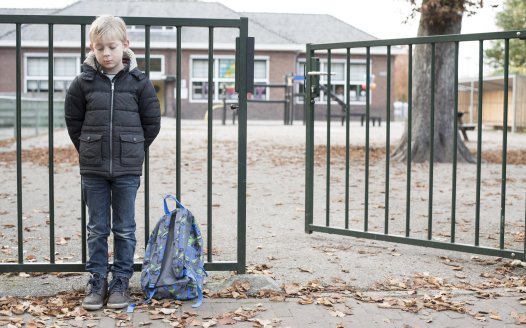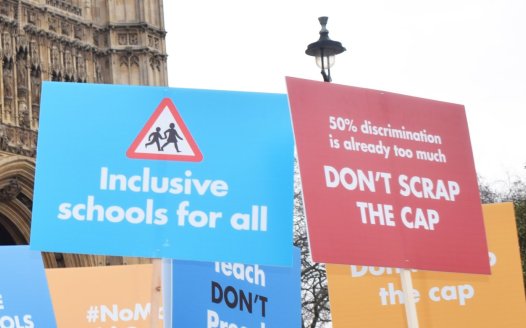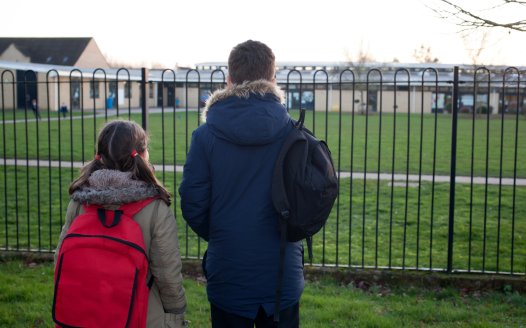Is the C of E ashamed of discrimination in school admissions?
Posted: Fri, 28th May 2021 by Alastair Lichten
Research suggests the Church of England downplays the extent of religious discrimination in admissions to the schools it runs. Its embarrassment shows the need to end this practice, says Alastair Lichten.
There is a widespread misconception, encouraged by the Church of England, that 'its' faith schools are open to all and do not religiously discriminate in admissions.
Like the C of E's efforts to avoid church schools being described as faith schools, efforts to downplay or obfuscate discriminatory admissions have various motivations.
Firstly, it is true that compared to other faith – but not community ethos – schools, C of E schools practice far lower levels of religious selection and are more interested in reaching beyond their own faith community.
Secondly, the C of E is more relaxed about efforts to reduce religious selection in admissions - although again only when compared to other faith groups. There are also voices within the church itself calling for a total end to religious selection.
Thirdly, and a cynic might say most importantly, the C of E simply recognises that religious discrimination in admissions is deeply unpopular, particularly in new school proposals.
For example, a new C of E faith school has been proposed in Kingston upon Thames. The local diocese claims the school will be open "to all faiths and no faith", and "children from families of any faith or no faith will be able to gain admission". This downplays the fact that up to a third of places will be selected based on religion. Similar language has been used in other C of E school proposals.
A row in the local press in Oldham this week has been revealing for similar reasons. Those behind a proposal to open a discriminatory C of E faith school have claimed its admissions policy is "specifically designed to be very inclusive". Local campaigners have rightly criticised these claims.
So, does the rhetoric match the reality? We looked at a random sample of 110 C of E schools' admissions policies to examine the extent of these practices. We found that 44 of those schools – 40% – had some sort of religious discrimination or selection in their admissions. And eight of those schools used potentially misleading language to obfuscate or downplay their religious selection.
Several schools emphasised how open they were to children from the local area, even when that was a low priority within their admissions criteria. For example:
- A school which said "admissions are prioritised for siblings and children living nearest to the school before offering places more widely". In reality, locality was fifth on its list of admissions criteria, below attendance at either a specific church, or any local Christian church.
- A school which claimed it "serves the local community and extends a warm welcome to all children whose parents live or work in the area". In reality, locality was seventh on its list of admissions criteria, below three other religiously selective criteria.
- A school which said "not being a church goer will not prevent your children from having a place", "you don't have to be a Christian or attend church to apply for a place", and "we welcome all children (of any & no faith)". In reality, locality was sixth on its list of admissions criteria, below attendance at either a specific church, or any local Christian church.
Other examples included:
- A school that said it was "inclusive" and it "welcomes children from all backgrounds". In reality, if it was oversubscribed, its criteria for admission included: "A commitment to the ethos of the Church of England. The criteria for this will be a letter from a minister confirming attendance of at least three times per year."
- A school that said: "We welcome children of all faiths or no faith". In reality, its oversubscription criteria give priority to those whose parents are "either practising members of the Church of England or practising members of another Christian denomination".
- A school that said: "We are a school rooted in the community and welcome applications from all." In reality a third of places at the school are foundation places (subject to specific religious selection) and for the remaining places locality is the bottom criterion, below attendance at specific local churches.
Defenders of these discriminatory practices may protest that they do not preclude those of other faith backgrounds from gaining places. They may claim that prioritising those of specific faiths does not indicate that those of other or no faith backgrounds are not welcome at all. And they may say that in practice undersubscription and low levels of religious adherence mean selection is lower than policies would theoretically permit.
These excuses are not always relevant, but they are always unpersuasive. A school which reserves the right to discriminate sends a damaging message, regardless of the extent it does so in practice.
In undersubscribed faith schools, discriminatory admissions criteria may not be applied. However, this increases the opposite problem of pupils being assigned faith schools against their families' wishes.
And our researchers also found that in 13 of the schools, language strongly suggested that parents would have to accept all aspects of the school's religious ethos. Examples included:
- "The governors welcome applications from all members of the community and ask all parents to respect the Christian ethos of the school and its importance to the community. Therefore, the governors hope that all pupils will take part in the Christian worship of the school and will attend Religious Education lessons."
- "Governors hope that parents who have chosen this school for their child have done so with the knowledge that it is a Church of England school with a distinctive Christian ethos. Governors, therefore, expect parents to give their full support to the ethos of the school."
- "We ask all parents applying for a place here to respect the ethos and its importance to the school community."
Parents attempting to withdraw their children from confessional religious education or collective worship often find such language is used to claim they have accepted all aspects of the school ethos. This can further dissuade non-Christian families, regardless of admissions.
Many may also assume that C of E faith schools will probably have voluntary controlled (VC as opposed to voluntary aided, VA) status. VC schools can only rarely religiously select, when permitted by their local authority. But there are 90% as many VA C of E faith schools as VC ones: 1,443 and 1,604, respectively. And in 2017 researchers found that 69% of C of E secondary schools practice some form of religious selection, affecting 50% of places across these schools.
Organising a school around an exclusive religious ethos fundamentally undermines claims of inclusivity. However, genuinely open admissions can at least reduce social segregation and force greater efforts towards inclusion.
The C of E is clearly embarrassed enough about religious selection to try sweeping it under the rug. It's time it was consigned to the dustbin.
Image: Monkey Business Images/Shutterstock.com.
No more faith schools
We need inclusive schools free from religious discrimination, privilege or control. Join our campaign.









